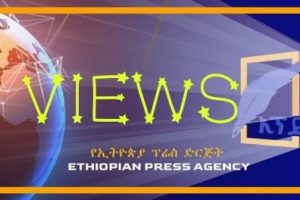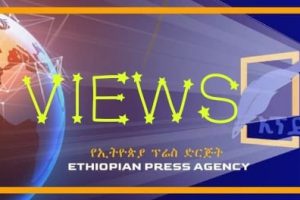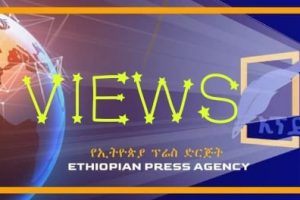BY WOSSENSEGED ASSEFA
‘Colonization is a first-order political necessity. A nation that doesn’t colonize is irrevocably destined for socialism and war between rich and poor. ’French philosopher Ernest Renan.
The African continent has passed through three phases of scramble; Colonial scramble, Cold War scramble and Resource scramble. The scramble for resources is of course today’s reality. Unlike the other colonial powers that have significantly reduced their influence on their colonies, the grip of French influence on its former colonies (particularly the West and Central African nations) did not cease with declaration of political independence.
By the time when independences were being negotiated the French took advantage by luring its colonies to sign ‘cooperation’ agreements in a manner that promotes its economic interests.
The agreements sometimes cited as neo-colonial pacts, allowed France to interfere in the affairs of its colonies. This gave a way for France to exercise and enhance its neo-colonial dominance over its former colonies in Africa.
This long, complex and often very murky relationship French has with its former African colonies is known as ‘Francafrique’. Félix Houphouet-Boigny, the first president of the ‘independent’ Cote d’Ivoire, was the one who coined the term in 1955. Since then, this term has been used several times in a pejorative meaning to describe French neo-colonial dominance in Africa.
The so called cooperation agreements included various issues; economic, monetary, cultural, juridical, and military. And these agreements are usually run behind the scenes.
But all forms of the agreements are always framed and checked by the French authorities and policy makers in a way that maintains the dominance of France over its former colonies.
Any African leader that goes against the will France or try to leave the Franc monetary zone must deal with consequences – financial, political and military pressure from the French government. Loyalty to the French government’s interest however is followed by lavish life styles and compensation. For the African dictators, maintaining francafrique was and still is a form of life insurance.
The cooperation accords were negotiated between Paris and individual African states upon their accession to independence. Charles De Gaulle, the then interim leader of France, made them quid pro quo for further French aid. When Guinean leader Sekou Touré, for example, refused to sign them, all French assistance to Guinea was immediately terminated, and all French personnel were abruptly withdrawn.
“Reports at the time said even things like telephone communication were dismantled and taken home to France,” a harsh reaction calculated as a deterrent to prevent further defections of the other colonies.
However, this neocolonial policy of France couldn’t have succeeded without the allegiance of the African governing leaders (most of them educated in France) that heavily rely on political, technical, military and economic support from France.
The meek silence of Francophone African intellectuals is also among the main reasons why francafrique is still perceived as legit both in the eyes of Africans and the French public who are convinced by ‘grand narrative’ that is ,without French involvement, the situation in its former colonies would be much worse.
Omar Bongo, President of Gabon for 42 years once said in favor of French’s presence in his country, “Gabon without France is like a car without a driver and France without Gabon is like a car without fuel.”
His French counterpart Jacques Chirac once said, “We have to be honest, and acknowledge that big part the money in our banks comes precisely from exploitation of the African continent.” He also added, “Without Africa, France would slide down into the rank of a third world power”
Indeed, French elites are still unable to think about their own country’s future, except in terms of the continued subjection of Africa. Even back in 1957, the future Socialist President François Mitterrand opined that “Without Africa, France will have no history in the twenty-first century.” This outlook has continued to guide French foreign policy: as recently as 2013, the French Senate expressed the same convictions in a report entitled “Africa is our future.”
Among others, the economic exploitation by the French on its 14 former colonies (from West and Central Africa) is predominantly severe. These former colonies are Benin, Burkina Faso, Guinea-Bissau, Ivory Coast, Mali, Niger, Senegal, and Togo from West Africa and Cameroon, Central African Republic, Chad, Gabon, Congo Republic and Equatorial Guinea are from Central Africa.
Its former colonies using CFA(Colonies Francaisesd’Afrique meaning French Colonies of Africa) as their currency are legally obliged to deposit 50% their foreign currency reserves in the French Treasury, and additional 20% for financial liability.
And these 14 former colonies, if they need foreign exchange they have to borrow from their own reserves with commercial interest rate. This and many other factors have impoverished the region severely.
In January 2019, the Italian Deputy Prime Minister, Luigi Di Maio, once accused his French counterpart of manipulating the economies of the former French colonies in Africa. He blamed France for impoverishing Africa and thereby encouraging migration to Europe.
Though the legality of the French monetary system has been dubious the African nations can’t afford to file a legal case the international community leaves it as it is.
The French finance minister is responsible to decide on the exchange rate and the money supply in these 14 states. Quite understandably many are outraged by the situation arguing that through these arrangements French strangles the economies of the CFA countries by limiting the liquidity of the central banks and by blocking their access to investment capital.
If banks don’t have enough cash to lend to investors, they tend to ration the credit with higher cost of lending (interest rates). Since CFA is pegged to Euro, when Euro is strong CFA also becomes strong. Strong CFA thereby creates a problem for small businesses that export to neighboring countries since the stronger CFA gets the price of exported items becomes more expensive and ultimately leads to lower volume of exports.
ECOWAS (Economic community of West African States) has been trying to adopt a common currency called ECO. This would of course free 8 former French colonies from the bondage of CFA. There is however a risk involved in this. As of 2019, Nigeria represents two-third of the GDP of the entire ECOWAS region and half of its entire population.
This, as scholars comment, the ECO zone will be dominated by Nigeria as the Euro Zone is dominated by Germany. May be this is a risk worth taking since inter-regional trade among the ECOWAS member countries would soar high. The ECO member states however have put several criteria to be met before the introduction of the ECO currency.
The following three are the major ones. Inflation rate less than 5%, budget deficit less than 3% of the GDP and foreign reserves that can cover over three months’ worth of imports. It is however unfortunate that none of the member states satisfies all the agreed criteria. It has been originally intended to be launched in 2000 however the ECO has been postponed multiple times, and the newest target date is 2020.
The West African Monetary Union has also made a deal with France in regard to the new currency – ECO. Under the deal, the Eco will remain pegged to Euro but the countries won’t have to keep their 50% foreign currency reserve in the French treasury.
Meanwhile, the Chinese encroachment to Africa has become a headache for France. These African states are now having China as their major trade partners.
When France sends troops, China sends business men. And this has made most African states tend to pick the latter. According to a survey published by ‘Afrobaromètre’ in 2016, 63% of Africans are in favor of the Chinese presence.
The current economic crisis that is swiping the world, the consequent of the Corona pandemic, is presumed to put China in a better position to further encroach its empire into Africa. This in turn might lead the French imperialism to its demise.
The French might surrender their dominance on West and Central Africa, commonly termed as the French backyard, to China. This however won’t happen without a fight (diplomatic and economic).
The Chinese has shown that they can be better development partners particularly to the Third World countries like ours. Sometimes it is even hard to imagine the infrastructural development in most African countries without the support of the Chinese government and its engineers. China has in hand most of the needs that African countries have.
Besides to the economic support the Chinese provide to Africa, they have also shown their relentless political alliance to African states against the brutal interference of the West in internal affairs. Chinafrique is all in all a better approach to most African states than with the relationship with the West which is still in its colonial mentality.
Africa Rise!
The Ethiopian Herald March 14/2021





